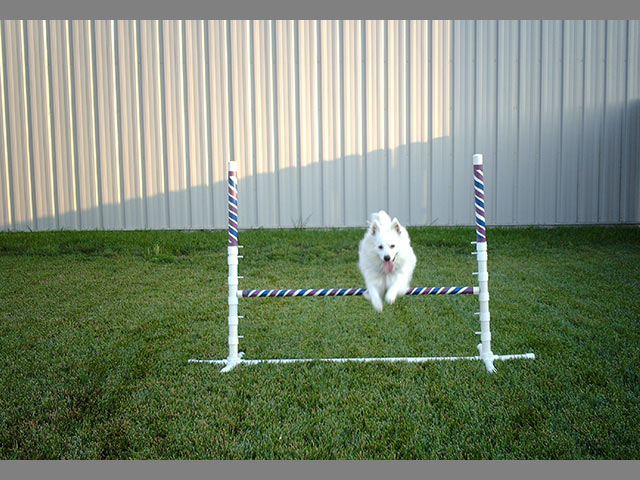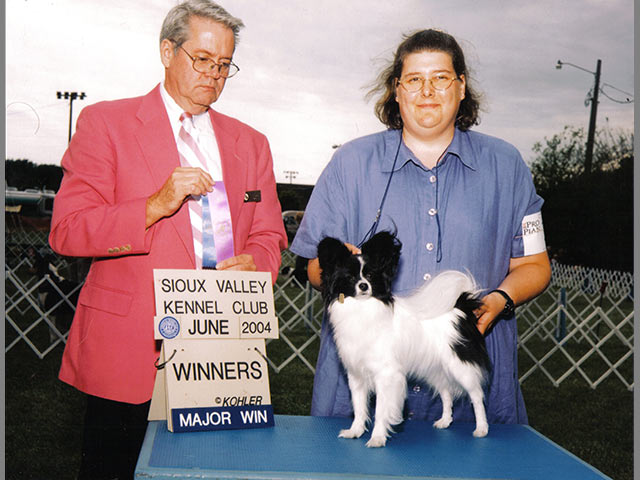From Shelters to the World


Humble Beginnings
An avid reader, when Lady began chewing furniture, Graybill headed to the library for help. "I wanted to know if I could get better control over her, and discovered obedience."
Graybill tried a few techniques. She also read about ways to help Lady burn excess energy. "I built what you could call agility equipment – all for fun, not for competition. I was just reading and trying out ideas." It worked.
Graybill learned that what she did to stop Lady's chewing was part of an AKC sport. She soon began winning with Lady in obedience. "Lady competed until she was 10. She earned her Companion Dog title before she passed away."
The Second Time
In 1996, when Lady was seven, Graybill again visited the shelter and spotted a fluffy white dog. She named her Gita.
When Gita was eight months old, Graybill met Samoyed breeders at her local club. "They said Gita was purebred! I was excited and started competing in agility. Gita took her work seriously! She also took play seriously. Gita was the first dog I formed a strong partnership with."
The duo began winning AKC-sponsored obedience, agility, and flyball events throughout Nebraska.
October 2005 was a joyful and tragic month for Graybill and Gita. "The first weekend, we won obedience, the second weekend we won agility, the third weekend we won flyball. We earned two titles in three weeks."
The following Wednesday, Gita died suddenly. Graybill later learned Gita had a liver tumor that ruptured during competition. What amazes Graybill is how Gita competed at the highest physical level, although she must have been in pain. "She wasn't acting any differently, and showed no symptoms. She just kept wanting to work."
Into the Ring
Graybill had a thirst for competition. Getting into the show ring had been a growing interest even with Lady and Gita. "But they didn't have papers, so they couldn't do conformation."
Graybill did the next best thing. "My sister had a Papillon named Albe, and the breeder wanted him to be a champion. My sister asked if I would take him to a show."
Walking into the ring that first time (a 2003 event in Topeka, KS) Graybill immediately felt how different it was from the atmosphere of obedience, agility, and rally. "Neither one of us knew anything. Albe was terrified! I put a little toy in my pocket, and took it out when the judge wasn't looking. I tried to give him a good experience."
The fear must have been well concealed, because the judge picked Albe. "When we won, my sister suggested I handle him. So I took Albe to AKC events, and we kept winning."
At each show, while she and Albe were in the ring, Graybill's sister videotaped them. "We'd watch the videos to see what I did wrong. At every show, we took winners dog or, at smaller trials, best in breed. Albe earned his championship in two years. I was lucky, he has so much sparkle and absolutely loves the ring."
Expanding Outward
Graybill wondered what else was out there. Again, fate kept smiling. Returning to her local shelter, she found an Australian Shepherd, whom she named Danny. At the library, Graybill learned about Aussie history, and enrolled Danny in herding classes.
"Danny and I just loved herding. But he started having seizures and could no longer compete."
The thrill of herding was firmly established. As luck would have it, a family owned an Australian Shepherd that was too much to handle. "They passed the dog to my herding instructor to find a home for him. That's how I got Quinn."
Around this time, Graybill was also interested in northern breeds. "I wanted an American Eskimo or Samoyed. I put my name in with Sammy breeders, but they didn't have puppies ready." Amazingly, Graybill headed to her local shelter again and spotted a one-year-old American Eskimo, whom she named Missy.
Missy has turned out to be a gifted competitor. "She has her rally and obedience titles, and I'm about to debut her in agility."
While developing Missy's talents, on any given weekend Graybill is also herding with Quinn. "It's a challenge, since I'm in the city and don't have access to sheep!"
Freelance Handler
With her knack for locating talented shelter dogs, Graybill is committed to purebred rescue. "I'm not against dogs from breeders, but fate has had different plans for me!"
This means that Graybill cannot show her dogs in conformation. But rather than a block, Graybill sees an opportunity to hone her talents as a freelance handler.
It started in 2003, with those successful experiences with Albe. It continued with another of her sister's dogs, a Siberian Husky named Bazz. "He's one major win away from becoming a champion. After that, he'll retire from the ring and do obedience."
Graybill's instincts have caught the eye of people around her, who often ask her to show their dogs. She always jumps at the chance. "There's an older woman who can't physically show her German Shepherd, so she asked me to handle him. I was able to get his title."
With no plans, Graybill goes to Nebraska and Kansas shows, where people approach her on the spot. "It's an informal thing. Sometimes, someone calls me the night before saying they can't make it and can I please handle their dog."
Her most recent freelance success was with a German Shepherd named Danae, who had never shown. Modestly, Graybill explains, "I got lucky. The judge thought Danae was pretty and put her up as winners dog. I was surprised."
The freelance handling has become a regular part of Graybill's life, an exciting facet of her canine connections. "I don't consider myself an official handler, and I don't take money. It's just for the enjoyment of being in the ring. If it ever became about money, I'd stop. That would make me feel pressured to get results! This way, there's no pressure."
Summing it Up
Graybill's attitude about handling defines her general approach to dog sports. "I love the connection of working with dogs, each of us looking at each other, paying attention to each other, really communicating. Every dog I succeed with has a strong drive and wants to work. Without that, I'd be lost in competitions."
